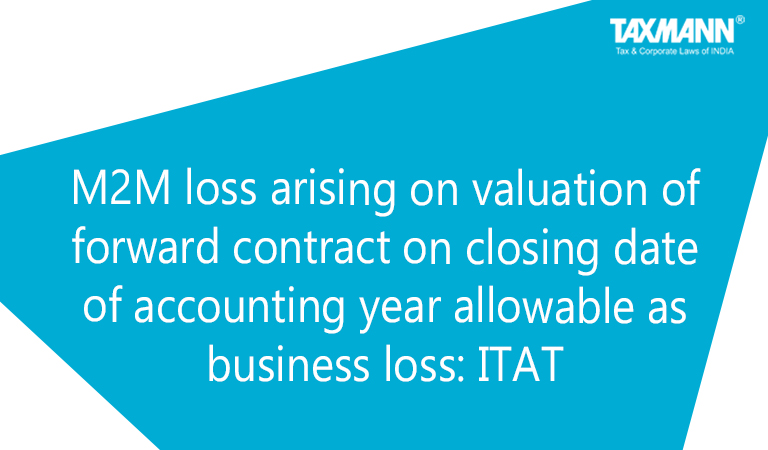M2M loss arising on valuation of forward contract on closing date of accounting year allowable as business loss: ITAT
- News|Blog|Income Tax|
- 3 Min Read
- By Taxmann
- |
- Last Updated on 29 September, 2021

Case Details: VVF (India) Ltd. v. ACIT - [2021] 130 taxmann.com 285 (Mumbai - Trib.)
Judiciary and Counsel details
-
- Saktijit Dey, Judicial Member and Manoj Kumar Aggarwal, Accountant Member
- Madhur Aggarwal, AR for the Appellant. Usha Gaikwad, DR for the Respondent.
Facts of the Case
Assessee was an importer of raw material from foreign vendors and exporter of finished products to foreign customers. It had entered into forward contracts as a hedge against loss arising due to fluctuation in foreign currency rates and claimed unrealized loss in respect of said contracts.
Assessing Officer (AO) in view of CBDT Instruction No. 3 of 2010 disallowed loss claimed by assessee holding that same being marked to market loss (M2M) was speculative and notional in nature. The CIT(A) upheld the order of the AO. Aggrieved-assessee filed the instant appeal before the Mumbai Tribunal.
ITAT Held
The Mumbai Tribunal held that there was no dispute between the assessee and the revenue that the forward contracts entered by the assessee with banks were in respect of underlying import/export transactions. Thus, they were in the nature of hedging contracts to safeguard against loss, if any, arising on account of fluctuation in foreign currency.
It was a fact that as per the consistent method of accounting followed by the assessee and applying Accounting Standard-11, the assessee restates the value of debtors, creditors, borrowings, and unsettled forward contracts at the yearend applying closing rate of the foreign currency.
It is also uncontroverted fact that on such restatement, if there is any gain, the assessee offers it as income, and in case there is a loss, the assessee claims it as deduction. The Departmental Authorities had also not disputed that the aforesaid accounting method was consistently followed by the assessee and accepted by the Department.
On a careful perusal of CBDT Instruction No. 3/2010, it can be found that the instruction clearly speaks about foreign exchange derivatives contracts and not hedging transactions. Thus, said CBDT instruction would not be applicable to the assessee. Accordingly, marked to market loss arising on valuation of forward contract on the closing date of accounting year was to be allowed as business loss under section 28(i).
Case Review
-
- CIT v. Woodward Governor India (P.) Ltd. [2009] 179 Taxman 326/312 ITR 254 (SC) (para 9)
- CIT v. Badridas Gauridu (P.) Ltd. [2004] 134 Taxman 376/[2003] 261 ITR 256 (Bom.) (para 9) followed.
List of Cases Referred to
-
- Bechtel India (P.) Ltd. v. Asstt. CIT [2017] 82 taxmann.com 301/165 ITD 282 (Delhi – Trib.) (para 3)
- CIT v. Woodward Governor India (P.) Ltd. [2009] 179 Taxman 326/312 ITR 254 (SC) (para 4)
- CIT v. Badridas Gauridu (P.) Ltd. [2004] 134 Taxman 376/[2003] 261 ITR 256 (Bom.) (para 4)
- CIT v. D. Chetan & Co. [2016] 75 taxmann.com 300/243 Taxman 356/[2017] 390 ITR 36 (Bom.) (para 4)
- Pr. CIT v. International Gold Co. Ltd. [IT Appeal No. 1827 (Bom.) of 2016] (para 4)
- Pr. CIT v. Vishinda Diamonds [IT Appeal No. 1841 (Bom.) of 2016] (para 4)
- Pr. CIT v. Osia Gems [IT Appeal No. 1221 (Bom.) of 2016] (para 4)
- Essel Propack Ltd. v. Dy. CIT [IT Appeal No. 5312 (Mum.) of 2015] (para 4)
- ACIT v. Shree Balkrishna Exports [IT Appeal No. 4185 (Mum.) of 2014] (para 4)
- S. Vinodkumar Diamonds (P.) Ltd. v. Dy. CIT [2020] 118 taxmann.com 317 (Mum. – Trib.) (para 4)
- Dy. CIT (International Taxation) v. Bank of Bahrain & Kuwait [2010] 41 SOT 290 (Mum.) (SB) (para 4)
- Everest Industries Ltd. v. Jt. CIT [2018] 90 taxmann.com 330 (Mum.) (para 4).
Disclaimer: The content/information published on the website is only for general information of the user and shall not be construed as legal advice. While the Taxmann has exercised reasonable efforts to ensure the veracity of information/content published, Taxmann shall be under no liability in any manner whatsoever for incorrect information, if any.

Taxmann Publications has a dedicated in-house Research & Editorial Team. This team consists of a team of Chartered Accountants, Company Secretaries, and Lawyers. This team works under the guidance and supervision of editor-in-chief Mr Rakesh Bhargava.
The Research and Editorial Team is responsible for developing reliable and accurate content for the readers. The team follows the six-sigma approach to achieve the benchmark of zero error in its publications and research platforms. The team ensures that the following publication guidelines are thoroughly followed while developing the content:
- The statutory material is obtained only from the authorized and reliable sources
- All the latest developments in the judicial and legislative fields are covered
- Prepare the analytical write-ups on current, controversial, and important issues to help the readers to understand the concept and its implications
- Every content published by Taxmann is complete, accurate and lucid
- All evidence-based statements are supported with proper reference to Section, Circular No., Notification No. or citations
- The golden rules of grammar, style and consistency are thoroughly followed
- Font and size that’s easy to read and remain consistent across all imprint and digital publications are applied



 CA | CS | CMA
CA | CS | CMA
